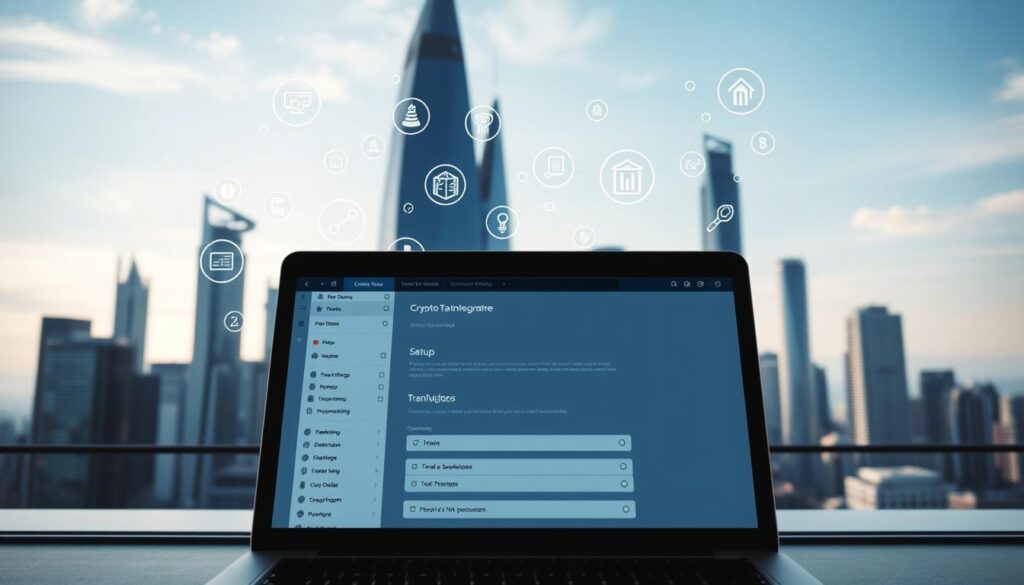Dealing with crypto taxes can be tough without the right tools. The IRS wants detailed records for every trade and transaction. Crypto tax software makes this easier by getting data directly from exchanges and wallets.
Tracking taxes by hand can lead to missed trades or mistakes. This increases the chance of audits. Crypto tax software connects to places like Coinbase or Binance, making data collection automatic. This helps avoid errors and keeps you in line with 2023 rules.
Key Takeaways
- Crypto tax software integrations reduce errors by syncing with exchanges like Coinbase and Binance.
- Manual reporting increases audit risks due to missed transaction details.
- Automated solutions handle complex calculations required by the IRS for crypto gains and losses.
- Integrations save hours spent compiling spreadsheets or export files.
- Modern software adapts to new IRS guidelines for staking, forks, and NFT sales.
Understanding the Cryptocurrency Tax Landscape in 2023
The IRS views cryptocurrency as property, so you must report every transaction. Capital gains taxes apply to sales, exchanges, and even airdrops. Tax compliance tools help track data to meet these needs. In 2023, new rules have made tax reporting integration even more important for accuracy.
Current IRS Guidelines for Crypto Assets
You need to report crypto transactions on Form 8949 and Schedule D. Each trade, airdrop, or DeFi activity is a taxable event. The IRS now wants exact cost basis and holding period details. Tax compliance tools help organize this data to meet these standards.
Recent Changes in Cryptocurrency Tax Reporting Requirements
2023 updates have made rules clearer for staking rewards and NFT sales. New forms, like 1040-Schedule 1 line 8b, ask about crypto activity. Tax reporting integration in software makes sure these details are captured right, avoiding mistakes.
Tax Implications of Different Crypto Activities
Activities have different tax treatments:
- Trading crypto for USD: capital gains
- Mining rewards: taxable as income
- Airdrops: may count as taxable income
- Hard forks: new assets trigger taxable events
Tax compliance tools figure out these scenarios, ensuring you follow the latest rules.
Why Crypto Tax Software Integrations Matter
Crypto tax software integrations are key to managing crypto taxes today. Transactions happen on many platforms, making manual tracking hard and slow. The IRS views crypto as property, needing exact tracking of all trades. Without crypto tax software integrations, users risk not following the rules with thousands of transactions each year.
- Data consolidation: Integrations get data straight from places like Coinbase or Binance, cutting down on manual work.
- Currency fluctuations: These tools update tax calculations in real time, making sure costs are reported correctly.
- Regulatory shifts: They keep up with IRS changes, like new forms or DeFi tax rules, reducing mistakes.
Imagine someone with over 500 trades in a year. Without software, they might miss important tax events, like DeFi yield harvests. AI-based solutions automate these tasks, spotting taxable actions and creating reports ready for audits. They handle all sorts of transactions, like NFT sales and staking rewards, crucial for avoiding fines. Without these integrations, taxpayers bear the full weight of compliance, making automated tax calculations essential, not just a nice-to-have.
Key Benefits of Automated Crypto Tax Solutions
Automated crypto tax solutions make tax time easier by doing the work for you.  They handle the mess of tracking trades and swaps across many wallets. For those with lots of assets, automated tax calculations save hours, turning days into minutes.
They handle the mess of tracking trades and swaps across many wallets. For those with lots of assets, automated tax calculations save hours, turning days into minutes.
Time Savings Over Manual Reporting
Manual tax work can take ages, especially with many transactions. Crypto accounting software does it all in seconds. It connects with big exchanges like Coinbase or Binance. It also figures out complex tax stuff like cost basis for new tokens, all without mistakes.
Error Reduction and Accuracy Improvements
Manual tax work often misses important details. Crypto accounting software follows IRS rules live, alerting you to taxable events. It checks every trade against IRS rules, making sure you’re in line with asset values.
Audit Trail Creation and Documentation
These systems keep detailed records of every transaction. They create logs ready for audits. Reports show trade dates, asset IDs, and fair market value, helping defend your tax position. Compliance teams can easily export IRS Form 8949, keeping everything in order.
Top Crypto Tax Software Integrations for Exchange Platforms
Choosing the right crypto API integration is key. It makes sure your tax software tracks every trade and transaction. Big exchanges like Coinbase, Binance, and Kraken need different setup steps to avoid missing anything. This part explains how these platforms work with top tax tools.
Coinbase Integration Capabilities
Coinbase users have two options: OAuth or API key. OAuth is fast but might miss old records. API keys give full access but need careful handling. Both methods link all trades and withdrawals to tax software like CoinTracker or Koinly.
Binance API Connection Options
Binance needs API keys with “Read” permissions for basic data. Users on Binance.US have tighter access than global users. Transactions before 2018 might lack exact timestamps, needing manual fixes in tax software. Always check API key permissions to avoid missing data.
Kraken and Other Exchange Solutions
Kraken’s API integration makes syncing easy for various activities. Gemini and Crypto.com offer similar reliability. FTX’s API had delays after 2022. TaxBit, a top software, often works with these exchanges for quick data.
Common problems include expired API keys and time zone mismatches. Most tax software now has tools to spot and fix these issues. This ensures you meet IRS reporting rules.
How DeFi Activities Impact Your Tax Reporting Needs
DeFi activities like liquidity provision and yield farming bring unique tax challenges. Events like impermanent loss from Uniswap pools or rebasing tokens on Balancer need careful tracking. Traditional tax methods can’t handle multi-step transactions, leading to compliance risks.
Tax reporting integration with DeFi platforms helps accurately classify events. This includes staking rewards or leveraged loans.
- Liquidity pools: Gains/losses from token swaps trigger taxable events.
- Yield farming: Rewards from protocols like Yearn.Finance must be reported as income.
- Rebasing tokens: Balancer’s algorithmic adjustments create taxable asset changes.
Effective tax compliance tools must understand smart contract interactions. They should track gas fees and classify wrapped tokens. Software like Koinly or CoinTracker now integrate with Aave and Compound, pulling data directly from blockchain ledgers.
Look for platforms that map multi-protocol transactions into a single taxable event timeline. This helps avoid omissions.
Users holding DeFi assets need tools that handle cross-protocol swaps. They should calculate cost basis across multiple DeFi platforms. Without specialized DeFi-focused tax reporting integration, manual tracking risks penalties or missed deductions.
Step-by-Step Guide to Setting Up Your First Crypto Tax Software Integration

To start with crypto API integration, first get your exchange account ready. Log into Coinbase, Binance, or Kraken and turn on two-factor authentication. Then, find the API settings in the account security section. Remember, the exact path might differ by exchange.
Save your API keys in a safe place. Never share them with anyone.
Preparing Your Exchange Account for API Access
- Log into your exchange and navigate to account security.
- Generate an API key with read-only access to avoid risks.
- Record the API key and secret in encrypted storage.
Make sure you follow the exchange’s official guides. This ensures your crypto tax tracking integration works right.
Configuring API Permissions Securely
- Set permissions to read-only for transaction history access.
- Limit IP addresses allowed to access the API if possible.
- Set key expiration dates to 30 days for added security.
Wrong permissions can stop data syncing. Always check access levels before saving.
Troubleshooting Common Connection Issues
Got a “401 Unauthorized” error? Try resetting the API key in the exchange and then enter it again in your tax software. If transactions are missing, check if the date range matches your account activity. Always compare synced data with your exchange statements for accuracy.
By following these steps, your crypto tax tracking integration will work well. Regularly check API access logs for any unauthorized activity. This helps keep you in line with IRS reporting rules.
Advanced Features to Look for in Crypto Tax Software
When picking tax preparation software, look for advanced features. These ensure you follow the rules and get your taxes right. Choose cryptocurrency tax software that lets you pick how to handle your taxes. Options like FIFO, LIFO, or HIFO can help you manage your gains and losses better.
Tools that automatically find ways to reduce your taxes are a big plus. They can spot chances to lower your taxable income without you having to do it all by hand.
- Multi-jurisdiction support: Software must adapt to regional tax rules, critical for global investors.
- Historical price databases: Verify if it tracks all tokens—even discontinued ones—to avoid IRS discrepancies.
- Custom reporting: Features like capital gains previews and transaction tagging simplify audit prep and portfolio analysis.
How well the software integrates is also important. Make sure it connects to blockchain explorers and supports CSV imports. This is key for those who trade often. It also helps with keeping track of your portfolio all year round.
It’s crucial to match your trading style with the software’s capabilities. Whether you’re holding onto your coins for a long time or trading them often, the right software can help you avoid overpaying taxes. Look at things like API limits, data export options, and how good the customer support is before you decide.
Comparing Leading Crypto Tax Software Integrations
Choosing the right crypto tax software is key. It depends on how well it integrates with your reporting. crypto tax software integrations differ a lot. So, it’s important to check exchange support, API reliability, and DeFi compatibility. Let’s compare top platforms side by side.
CoinTracker vs. CoinLedger
CoinTracker is great for Coinbase users. It imports data smoothly and groups transactions well. CoinLedger, on the other hand, supports DeFi better. It handles complex protocols like Uniswap or Aave accurately.
Both offer IRS-compliant reports. But CoinTracker is cheaper for casual investors.
Koinly vs. ZenLedger
- Koinly works with over 200 exchanges and wallets. It’s perfect for those with many chains.
- ZenLedger focuses on US tax rules. It makes filing Form 8949 easier for traders.
- Both can import CSV files. But Koinly’s blockchain explorer is better for tracking transactions.
TaxBit and Enterprise Solutions
TaxBit is great for big users. It’s SOC 2-certified and connects to QuickBooks and Xero. Its API handles lots of transactions, which is good for big businesses.
Think about your needs and compare these features. Real users say CoinLedger is good for audits and Koinly tracks NFTs well.
NFT Transactions: Special Considerations for Tax Reporting
NFTs make tax reporting tricky because they are seen as collectibles. You need special tools for tax reporting integration. These tools track sales, buys, and royalties. Top crypto accounting software links with OpenSea and Rarible. But, they might miss some details.

How Tax Software Handles NFT Purchases and Sales
- Automated imports from major NFT marketplaces make logging transactions easy.
- Gas fees and royalty payments can be misclassified without manual fixes.
- Calculating capital gains needs exact cost basis tracking, especially for fractional ownership.
Metadata Challenges with NFT Collections
Unique identifiers like edition numbers and creator royalties make valuing NFTs hard. Top solutions like Koinly and CoinTracker now offer:
- Visual galleries link metadata to transaction records.
- Floor price tracking helps estimate values.
- Collection grouping helps with sales of multiple assets.
Still, you need to add manual logs for rare metadata traits. Crypto accounting software is getting better. But, users must stay alert for accurate reporting.
Security Best Practices When Using Crypto Tax Software Integrations
Using crypto API integration with tax tools needs careful security steps. Every link to exchanges or wallets can be risky if not handled right. If API keys are not secure, your trading history and wallet balance could be exposed.
First, use read-only API permissions when you can. This stops tax software from changing your data. Then, add two-factor authentication (2FA) to all linked accounts. Change API keys often to avoid long-term risks if one is stolen. Also, limit API access to certain IP addresses to block unauthorized access.
- Make sure the tax tool has security certifications like SOC 2 or GDPR.
- Use strong encryption for data, like AES-256 or TLS 1.2+.
- Check API logs weekly for any unauthorized access.
Never use the same API key for different services. Give each tax compliance tools platform its own key. Check the software’s privacy policy to see if they keep your API keys safe. Close unused integrations and accounts to lower your risk.
- Checklist items:
- Make sure API key permissions are right for your needs
- Use API access whitelisting
- Watch for any suspicious activity alerts
There’s a common myth about API security. Just because you connect through an approved API, it doesn’t mean you can withdraw money. By taking these steps, you can keep your financial info safe while using tax automation.
Addressing Multi-Wallet and Cross-Chain Transaction Complexities
Managing transactions across multiple wallets and blockchain networks is a big challenge. Users with assets on Ethereum, Solana, or Polygon need tools that bring together scattered data. Automated tax calculations help by linking all addresses into one view.
- Software like CoinTracker and Koinly gather transactions from various sources
- Advanced platforms auto-detect cross-chain bridges to catch all taxable events
- Wrapped Bitcoin (WBTC) swaps and layer-2 transfers are tracked using blockchain explorer APIs
Cross-chain movements can lead to “phantom” transactions. For instance, sending ETH to Arbitrum results in two entries: an outgoing burn and an incoming mint. Tax tools now match these paired events to avoid double-counting gains. Users should check bridge activity manually to ensure accuracy.
Wrapped assets and liquidity pools require automated tax calculations to track cost basis through complex swaps. Best practices include:
- Keeping a master list of all public wallet addresses
- Flagging non-custodial wallet activity with timestamp tags
- Reviewing cross-chain transfers quarterly for audit trails
Software like ZenLedger tracks chain-specific fees, crucial for accurate cost basis calculations. Proactive users combine automated tools with manual audits for critical transactions.
Cost Analysis: Is Premium Crypto Tax Software Worth It?
Deciding between free and premium tax preparation software depends on how active you are in crypto. Free versions might limit how many trades you can track or don’t offer detailed reports. On the other hand, paid plans start at $50 a year and offer more features like tracking unlimited trades and syncing with multiple exchanges.
For those who trade a lot, doing taxes manually can take over 20 hours a year. This is time that could be better spent on other things like investing or earning more money.
- Free options: Good for those with less than 100 trades a year but might miss some important sales or earnings
- Premium plans: Cost between $50 and $500+ for features like optimizing cost basis and getting audit reports
- Professional tiers: $200+ for extra services like having a CPA review your taxes through TaxBit or TokenTax
Paying for cryptocurrency tax software can help avoid big fines from the IRS. The IRS can fine you $10,000 or more if you don’t report your crypto gains. Using a service like CoinTracker’s CPA review package ($399) is cheaper than hiring a tax lawyer after an audit.
Traders who are very active can save up to 30 hours by using paid software to prepare Form 8949. This is like saving $1,500 at $50 an hour. But, if you’re not trading much, a free version might be enough. Still, premium software can help you avoid missing out on deductions.
Common Mistakes to Avoid When Implementing Tax Software Solutions
When you set up crypto tax software, you must be precise to avoid mistakes. These errors can mess up your tax compliance. Here are some common mistakes to watch out for:
- Partial data imports: Not importing all historical transactions can lead to wrong cost basis calculations. Always check that exchanges like Coinbase or Binance are fully synced.
- Untracked wallet addresses: Missing wallet activity across different platforms can cause problems. Use tax compliance tools to track all addresses on exchanges and DeFi platforms.
- Transaction mislabeling: Mistaking staking rewards for transfers or ignoring airdrop events can lead to IRS errors. Check logs weekly to make sure everything is labeled right.
While crypto tax software makes reporting easier, relying too much on it can hide errors. Year-end transactions might not sync right away, so manual checks are needed before filing. Tools like CoinTracker or Koinly help find discrepancies through audits.
Don’t wait to update your software—outdated versions miss new IRS rules. Keeping your software current and backing up data regularly helps keep your tax tools working well. Small mistakes can grow into big problems under IRS scrutiny. Make sure to test and verify everything to keep your records accurate.
Taking Control of Your Crypto Tax Journey
Start by picking crypto tax tracking that fits your portfolio. With new rules like expanded 1099 reporting, using tax reporting tools is key. Make sure your software updates with IRS changes and your growing assets.
Check for transaction updates monthly and match balances. Keep clear records with audit trail features. Set reminders for tax season and document every trade, including NFT sales and cross-chain transfers. Tools like CoinTracker and Koinly can help but need your watchful eye.
Stay alert to stricter compliance standards. Keep up with changes to Form 1040 and state rules. While tech helps, you must ensure accuracy. Choose software with real-time updates and audit-ready reports. Balance tech and personal responsibility to manage your crypto tax journey.
FAQ
What is cryptocurrency tax software integration?
Cryptocurrency tax software integration connects your trading platforms, wallets, and tax software. It automates data transfer and tax calculations. This ensures you report your taxes accurately.
How do crypto tax software integrations make tax reporting easier?
These integrations make tax reporting easier by automatically getting transaction data from exchanges and wallets. They cut down on manual entry, reducing errors. This makes tax calculations automatic and efficient.
What types of tax software integrations are available for crypto transactions?
There are many crypto tax software integrations out there. They connect with exchanges like Coinbase, Binance, and Kraken, as well as wallets and DeFi protocols. Each offers unique features, like crypto API integration and tax tracking solutions.
Why is compliance important in cryptocurrency taxation?
Compliance is key because cryptocurrency taxation is complex and changing. Not reporting correctly can lead to penalties and audits. Good tax compliance tools help you track transactions and keep records, ensuring you follow IRS rules.
How does automated tax calculation work in crypto tax software?
Automated tax calculations in crypto tax software gather transaction data from various sources. They apply tax rules to figure out what’s taxable. This includes calculating capital gains, losses, and income from trading and staking.
Can crypto tax software handle multi-wallet transactions?
Yes, advanced crypto tax software can handle data from multiple wallets and blockchain networks. It helps users track transactions across different platforms seamlessly.
What security measures should I consider when using crypto tax software?
When using crypto tax software, consider using read-only API permissions and regular key rotations. Also, set IP address restrictions. Make sure the software is SOC 2 compliant and uses encryption to protect your data.
How do I choose the right crypto tax software for my needs?
When picking crypto tax software, look at features like automated tax calculations and integration depth. Also, consider the user experience and any extra needs, like NFT support or tax rules for multiple countries.
Are there specific challenges when reporting DeFi transactions?
Yes, DeFi transactions can be tricky due to their complexity. This includes things like impermanent loss, token swaps, and multi-step transactions. Specialized tax software can accurately classify these events and calculate the tax implications.
What common mistakes should I avoid when using crypto tax software?
Avoid mistakes like not reconciling transactions between exchanges and wallets, misclassifying transactions, and not updating your software with tax law changes. Regularly check your data to avoid these errors.


No comments yet